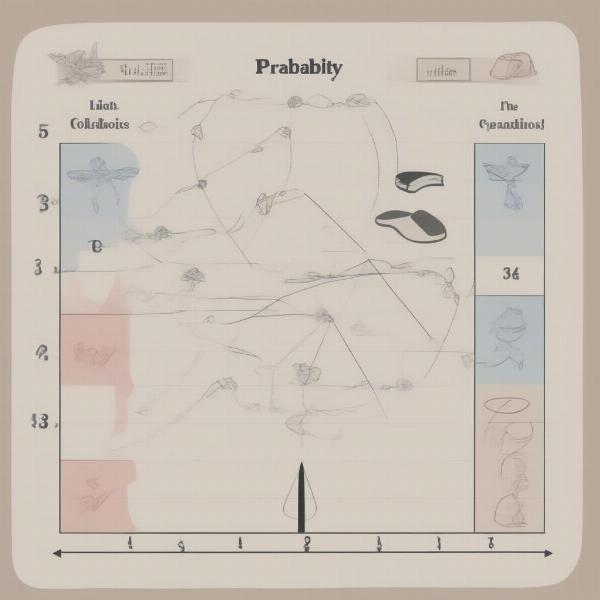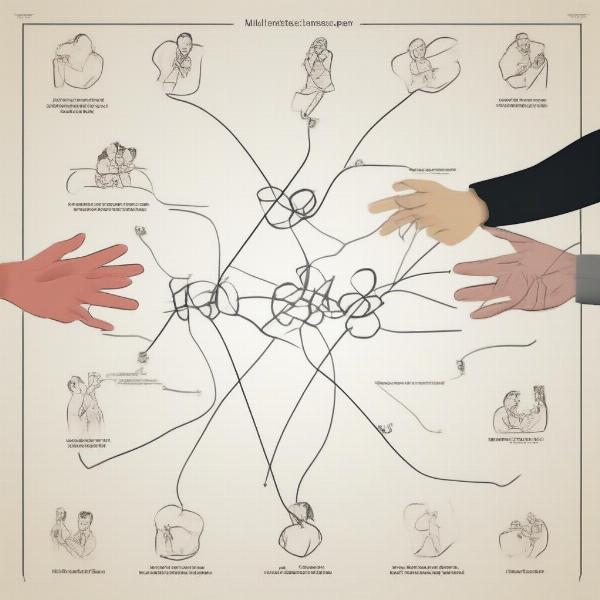Rock paper scissors. A simple game played worldwide, settling everything from who gets the last slice of pizza to more serious playground disputes. But Is Rock Paper Scissors A Fair Game? The answer, surprisingly, is more complex than a simple yes or no.
A Deep Dive into Rock Paper Scissors Fairness
While seemingly random, rock paper scissors, or RPS as it’s sometimes abbreviated, has a foundation in mathematical probability. Each choice – rock, paper, or scissors – has an equal chance of being chosen (1/3 probability). This inherent balance is what contributes to the perception of fairness. However, the human element introduces intriguing wrinkles.
Perfect Play and Predictability
In a truly fair game of rock paper scissors, each player would select their option completely randomly. This is often referred to as “perfect play.” However, humans aren’t random number generators. We have tendencies, patterns, and biases that can be exploited. This predictability can shift the game away from pure chance and into the realm of strategy, disrupting the fairness.
Studies have shown certain patterns emerge in how people play RPS. For instance, rock is often the most common opening move, perhaps due to its perceived strength. Knowing this, a savvy opponent might choose paper, increasing their odds of winning that round. Therefore, the perceived fairness diminishes if one player anticipates the other’s choices.
 Rock Paper Scissors Probability Chart Showing Even Odds
Rock Paper Scissors Probability Chart Showing Even Odds
The Role of Psychology in Rock Paper Scissors
Beyond simply predicting moves, psychology plays a significant role. Factors like body language, facial expressions, and even previous rounds can provide subtle clues about an opponent’s next move. Experienced players often become adept at reading these tells, further skewing the perceived fairness. This psychological element introduces a layer of skill and strategy that goes beyond the random selection of options.
Imagine playing against someone known for their poker face. Their lack of emotional expression would make it much harder to predict their move, reinforcing the fairness aspect of the game. Conversely, someone who visibly reacts to winning or losing could inadvertently reveal their future choices.
Beyond a Two-Player Game: Rock Paper Scissors in Larger Groups
While typically played with two individuals, rock paper scissors can be adapted for larger groups. However, the dynamics of fairness change significantly when more players are involved. The introduction of more variables makes predicting outcomes more complex, and the potential for ties increases significantly. This can lead to protracted games and a sense of frustration, potentially impacting the perceived fairness.
 Diagram of Rock Paper Scissors Multiplayer Game with Multiple Outcomes
Diagram of Rock Paper Scissors Multiplayer Game with Multiple Outcomes
Exploiting Imperfect Play: Strategies for Winning Rock Paper Scissors
Even though the game is fundamentally based on chance, understanding human psychology and applying some basic strategies can improve your odds. Recognizing common patterns, like the tendency to choose rock first, or paying attention to opponent’s tells, can offer a competitive edge. However, keep in mind that employing these strategies doesn’t necessarily make the game unfair; it simply exploits the predictable imperfections of human play.
The Double Play and Other Tactical Maneuvers
One common strategy is the “double play.” If you lose with rock against paper, your opponent might expect you to switch to scissors in the next round. Instead, playing paper again can sometimes catch them off guard. This tactical thinking adds depth to what might initially appear as a purely random game.
Is it Fair? A Matter of Perspective
So, is rock paper scissors a fair game? In the purest theoretical sense, with perfect random play, absolutely yes. Each option has an equal chance of success. However, the introduction of the human element, with our predictable patterns and psychological tells, complicates the matter. The ability to exploit these imperfections introduces an element of skill, which can shift the perception of fairness. Ultimately, whether you consider rock paper scissors fair depends on how you define fairness in the context of a game that balances chance with human psychology.
“Rock paper scissors isn’t just about luck,” says Dr. Emily Carter, a game theorist at the University of California, Berkeley. “It’s a simplified model of human decision-making, where chance interacts with strategy and psychology.”
“The beauty of rock paper scissors,” adds Professor Kenji Tanaka, a cognitive psychologist at Kyoto University, “lies in its deceptive simplicity. It’s a game anyone can play, but mastering it requires an understanding of both probability and human behavior.”
In conclusion, while the inherent randomness of rock paper scissors suggests a fair game, the influence of human psychology and strategic play creates a more nuanced reality. So, next time you’re settling a debate with a quick game of RPS, remember that while luck plays a role, there’s more to it than meets the eye. What strategies will you employ to gain the upper hand? Share your thoughts in the comments below!
FAQ
- What is the optimal strategy for rock paper scissors? There is no single optimal strategy. Perfect play involves completely random choices. However, exploiting predictable patterns in human behavior can offer an advantage.
- Can rock paper scissors be used in serious decision-making? While not ideal for critical decisions, rock paper scissors can be a fun and impartial way to settle minor disputes.
- Is there a mathematical formula for winning rock paper scissors? No, there’s no guaranteed formula. The game’s fairness stems from the equal probability of each option.
- How does psychology affect rock paper scissors? Psychology plays a crucial role, as players may unconsciously reveal their next move through body language or facial expressions.
- What are some common mistakes in rock paper scissors? Predictable patterns, like always starting with rock, are common mistakes that can be exploited.
- Can rock paper scissors be played with more than two people? Yes, but the dynamics and fairness change with more players involved.
- Is rock paper scissors a game of skill or luck? It’s a blend of both. While the foundation is chance, understanding human psychology and strategy can influence outcomes.

